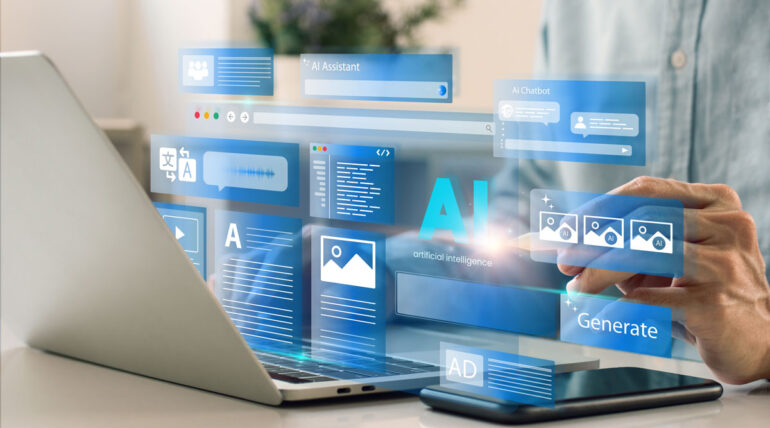
As artificial intelligence (AI) continues to revolutionize various industries, one area where it has gained traction is website design and development. AI-generated websites leverage machine learning algorithms to create, design, and sometimes manage websites automatically. While this technology offers significant advantages such as speed, affordability, and ease of use, it also presents several disadvantages that businesses and individuals should consider before adopting AI-generated websites.
1. Lack of Originality and Creativity
AI-generated websites often rely on pre-designed templates and algorithms that prioritize efficiency over creativity. While these templates can be visually appealing, they may lack originality. Many AI tools produce websites that are generic and similar to others, which can make it difficult for a brand to stand out. The result is often a “cookie-cutter” appearance that might not resonate with users or reflect a brand’s unique identity.
2. Limited Customization
AI tools are typically designed to provide quick and functional solutions based on a predefined set of rules and inputs. This often limits the extent to which a website can be customized. Users may find themselves restricted by the capabilities of the AI, unable to modify certain elements beyond the default options offered by the platform. For businesses with specific needs or complex requirements, AI-generated websites may fall short of delivering a tailored user experience.
3. Poor User Experience (UX) Design
While AI can automate the design process, it may not always understand the nuances of user behavior and experience. UX design is a critical aspect of web development that focuses on how users interact with a site, ensuring that it is intuitive and easy to navigate. AI-generated websites might lack the human insight necessary to create a seamless user experience. As a result, the site could feel disjointed or confusing, leading to higher bounce rates and lower user engagement.
4. Security Vulnerabilities
AI tools might not always be up-to-date with the latest security standards and practices. Websites generated using AI can be vulnerable to cyberattacks, especially if they lack proper encryption, authentication measures, or regular updates. AI platforms typically focus on functionality, which could lead to oversight when it comes to securing sensitive data. Businesses using these platforms need to be vigilant about security vulnerabilities that could compromise user data and trust.
5. Dependence on Predefined Parameters
AI-generated websites work within a limited scope of algorithms that rely on predefined rules. While this can streamline the development process, it also means that AI might not be able to adapt to unique requirements or outlier situations. For example, an AI may not be able to respond to changing user preferences, new market trends, or innovative design approaches. This rigid framework can restrict the flexibility that human designers bring to web development.
6. Limited SEO Capabilities
Search engine optimization (SEO) is essential for increasing a website’s visibility on search engines. AI-generated websites may lack in-depth SEO capabilities since they follow basic optimization rules without the finesse or strategy that a human expert would provide. Effective SEO often requires an understanding of specific industry trends, keyword strategies, and content planning, which AI-generated platforms might not be able to provide at a sophisticated level.
7. Lack of Human Touch in Content Creation
AI can generate text, images, and other media, but it often lacks the emotional depth, context, and relatability that humans naturally inject into content. For websites that require persuasive copy, storytelling, or a strong brand voice, AI-generated content can fall flat. It may sound robotic, repetitive, or generic, which can alienate visitors and reduce engagement.
8. Hidden Costs
While AI-generated websites are often marketed as affordable alternatives to traditional web development, hidden costs can arise. For instance, businesses may need to invest in additional tools or services for SEO, security, or advanced customization features. Additionally, some AI website builders operate on subscription models, meaning that long-term use can become expensive. This can negate the initial cost-saving benefits and make AI-generated websites less appealing in the long run.
9. Limited Support and Maintenance
Human web developers typically offer ongoing support, maintenance, and updates for a website, ensuring that it runs smoothly and adapts to changing technologies. AI-generated platforms, on the other hand, may offer limited support or rely on automated customer service. In case of technical issues or required updates, businesses may find themselves without adequate assistance, leading to downtime or unresolved problems.
Conclusion
While AI-generated websites offer numerous advantages, such as speed and cost-effectiveness, they also come with significant disadvantages. These include limitations in creativity, customization, and user experience, as well as potential security risks and hidden costs. For businesses or individuals seeking a truly unique, flexible, and user-centric website, human involvement in design and development remains essential. Carefully weighing the pros and cons is crucial when deciding whether to rely on AI for website creation.
